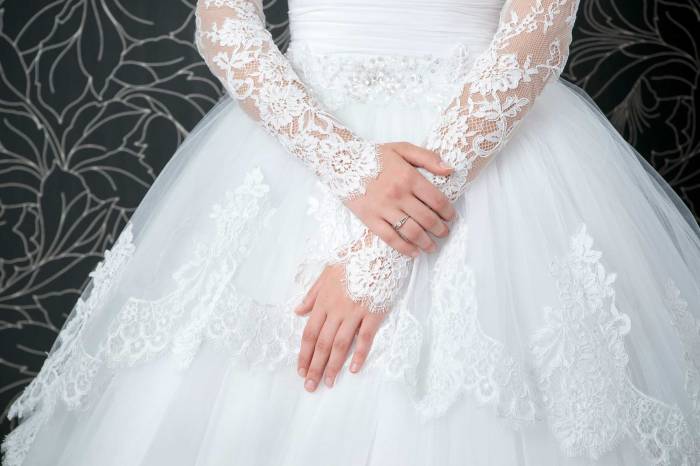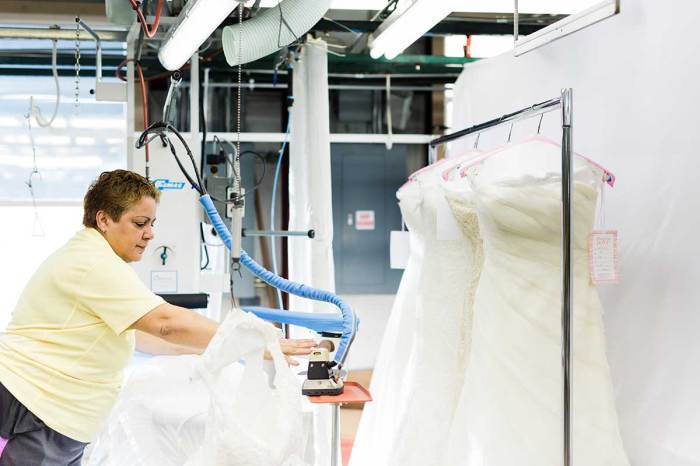Finding Reputable Dry Cleaners
Dry cleaners wedding dress – Choosing the right dry cleaner for your wedding dress is crucial for preserving this cherished keepsake. Several factors contribute to making an informed decision, ensuring your gown receives the expert care it deserves.
Key Factors in Selecting a Dry Cleaner
Three key considerations when selecting a dry cleaner for your wedding dress are experience, specialization, and insurance.
- Experience: Look for a cleaner with a proven track record of successfully cleaning delicate fabrics, especially wedding gowns. Years of experience often translate to a deeper understanding of various fabrics and cleaning techniques.
- Specialization: Bridal gown cleaning is a specialized service. A dry cleaner specializing in bridal wear possesses the knowledge and equipment to handle intricate details like beading, embroidery, and delicate lace without causing damage.
- Insurance: Ensure the dry cleaner carries adequate insurance to cover any potential damage to your gown. This safeguards your investment in case of unforeseen accidents or mishaps during the cleaning process.
Comparing Dry Cleaner Services

Source: imperialcleanersidahofalls.com
Specialized bridal gown cleaners often offer a more comprehensive service than general dry cleaners. While general dry cleaners might clean your dress, they may lack the expertise and specialized equipment to handle the delicate nature of bridal fabrics and embellishments. Specialized cleaners often provide services like stain removal, preservation treatments, and even restoration for damaged gowns.
Dry Cleaner Evaluation Checklist
Before entrusting your wedding dress, use this checklist to assess the dry cleaner’s reputation and expertise:
- Check online reviews and testimonials.
- Inquire about their experience with similar fabrics and embellishments.
- Request to see examples of their previous work.
- Verify their insurance coverage.
- Ask about their cleaning methods and preservation techniques.
- Confirm their process for handling delicate details like beading and lace.
Pre-Cleaning Preparations
Proper preparation before sending your wedding dress to the dry cleaner is essential to minimize potential damage and ensure the best possible cleaning results. This involves several key steps to protect your gown’s delicate fabric and embellishments.
Preparing Your Wedding Dress for Cleaning

Source: affordablepreservation.com
Before sending your dress, carefully remove any loose debris such as petals, confetti, or dirt using a soft brush. Gently blot any visible stains with a clean, white cloth and distilled water. Avoid rubbing, as this can spread the stain. It is crucial to identify the fabric composition of your dress (e.g., silk, satin, lace) by checking the care label.
This information will guide the dry cleaner in selecting the appropriate cleaning method.
Identifying Fabric Composition
Knowing your dress’s fabric composition is paramount. Different fabrics require different cleaning techniques. Incorrect cleaning methods can lead to irreversible damage. The care label often provides this information; if not, a fabric identification test may be necessary.
Packaging Your Wedding Dress
To protect your dress during transport, place it in a breathable garment bag, ideally one made of acid-free material. Avoid using plastic bags, as these can trap moisture and cause damage. If possible, use a sturdy box to prevent crushing or creasing. Clearly label the package with your contact information and any specific cleaning instructions.
Dry Cleaning Methods and Processes
Several dry cleaning methods exist, each with its advantages and disadvantages when it comes to preserving a wedding dress. The choice of method depends on the fabric type and the condition of the dress.
Dry Cleaning Methods for Wedding Dresses
Common dry cleaning methods include dry cleaning using perchloroethylene (PERC) or hydrocarbon solvents, and wet cleaning. PERC is a traditional solvent, effective for many fabrics, but concerns about its environmental impact have led to increased use of hydrocarbon solvents, which are considered more environmentally friendly. Wet cleaning involves using water-based solutions and is suitable for certain delicate fabrics that might not tolerate solvent-based cleaning.
Solvents vs. Wet Cleaning

Source: oceansidecleaners.com
Solvent-based cleaning is generally effective for removing various soils and stains, but it can be harsh on some delicate fabrics. Wet cleaning is gentler but may not be suitable for all fabrics or stains. The choice depends on the dress’s fabric and condition. A reputable dry cleaner will assess your dress and recommend the most appropriate method.
Professional Dry Cleaning Process
A typical professional dry cleaning process involves: inspection of the dress for damage and stains; pre-treatment of stains; selection of appropriate cleaning method and solvent/detergent; cleaning process itself; post-cleaning inspection; pressing and finishing; packaging for safe storage.
Post-Cleaning Care and Preservation
Proper storage is crucial to maintaining the condition of your professionally cleaned wedding dress. Following these steps will help prevent damage and preserve its beauty for years to come.
Storing a Cleaned Wedding Dress
Store your dress in a cool, dark, and dry place, away from direct sunlight and moisture. Use a breathable, acid-free garment bag to protect it from dust and light. Avoid using plastic bags, which can trap moisture and cause yellowing or mildew.
Creating a Protective Garment Bag
A high-quality garment bag made of breathable, acid-free tissue paper or muslin is ideal. Ensure the bag is large enough to accommodate the dress without causing creases or strain. Avoid using plastic bags, which can trap moisture and lead to damage.
Storage Solutions Comparison
| Storage Solution | Pros | Cons | Cost |
|---|---|---|---|
| Acid-free box | Excellent protection from light and dust | Can be bulky; may not be suitable for all dress styles | Moderate |
| Garment bag (acid-free) | Convenient, space-saving | Offers less protection than a box | Low to moderate |
| Climate-controlled storage | Optimal protection against environmental damage | Most expensive option | High |
Addressing Specific Concerns: Dry Cleaners Wedding Dress
Several issues can arise during the dry cleaning of wedding dresses. Understanding these potential problems and preventative measures is crucial.
Common Dry Cleaning Issues
Common issues include beading loss, discoloration, and fabric damage. Beading can be lost due to improper handling or cleaning methods. Discoloration can occur due to improper stain treatment or exposure to light and moisture. Fabric damage can result from using harsh chemicals or inappropriate cleaning techniques.
Preventing Dry Cleaning Issues
To minimize these issues, choose a reputable dry cleaner with experience in handling delicate fabrics. Clearly communicate any concerns about specific embellishments or stains. Consider pre-treating minor stains before sending the dress for professional cleaning.
Questions to Ask Your Dry Cleaner
- What is your experience cleaning wedding dresses made of [specific fabric]?
- What cleaning methods do you use, and are they appropriate for my dress?
- What is your process for handling delicate embellishments like beading and lace?
- Do you have insurance to cover potential damage?
- Can I see examples of your previous work?
Cost and Budgeting
The cost of professional wedding dress cleaning varies based on several factors. Planning your budget accordingly is essential.
Cost of Professional Wedding Dress Cleaning, Dry cleaners wedding dress
| Factor | Cost Range |
|---|---|
| Dress Size (Simple) | $100 – $250 |
| Dress Size (Intricate) | $250 – $500+ |
| Fabric Type (Delicate) | Additional $50 – $150+ |
| Stain Removal | Variable, depending on the type and severity of stains |
Note: These are estimated ranges and can vary significantly depending on location and the dry cleaner’s pricing structure.
Budgeting Strategies
Incorporate the cost of cleaning and preservation into your overall wedding budget early on. Consider setting aside a specific amount for this expense to avoid unexpected financial strain.
Professional vs. DIY Cleaning
While DIY methods might seem cost-effective, they risk irreversible damage to your dress. Professional cleaning offers peace of mind and ensures your gown is handled with expertise, preserving its value and beauty for years to come.
Alternative Preservation Methods
Besides dry cleaning, other methods exist for preserving your wedding dress. Each method has its advantages and drawbacks.
Alternative Preservation Methods
Alternative methods include freezing and vacuum sealing. Freezing involves storing the dress in a sealed bag in a freezer to inhibit microbial growth. Vacuum sealing removes air from the bag, minimizing oxidation and reducing the risk of damage. However, these methods do not clean the dress and may not be suitable for all fabrics.
Comparing Preservation Methods
Dry cleaning offers the best cleaning and preservation, while freezing and vacuum sealing primarily focus on preservation, not cleaning. Freezing is a low-cost option, but it doesn’t address stains or dirt. Vacuum sealing offers better protection against oxidation than freezing but still doesn’t clean the garment.
Vacuum Sealing Process
First, carefully inspect your dress for any loose debris. Then, place the dress in a large, acid-free garment bag, ensuring it is wrinkle-free. Seal the bag using a vacuum sealer, removing as much air as possible. Store the sealed bag in a cool, dark, and dry place. Regularly check the seal to ensure it remains intact.
FAQ
Can I wash my wedding dress at home?
Generally, it’s strongly discouraged. Home washing can damage delicate fabrics and embellishments. Professional cleaning is recommended.
How long does professional wedding dress cleaning take?
Turnaround time varies depending on the cleaner and the complexity of the dress, but typically ranges from a few weeks to a month.
What if my dress has intricate beading or embroidery?
Inform the dry cleaner about any embellishments beforehand. Reputable cleaners have experience handling delicate details.
What’s the difference between wet cleaning and dry cleaning?
Dry cleaning uses solvents, while wet cleaning uses water. The best method depends on the fabric; your cleaner can advise.
How much should I budget for wedding dress preservation?
Costs vary widely depending on the dress, fabric, and cleaning method. Expect to spend several hundred dollars.
